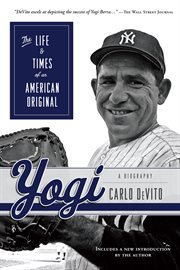Review by New York Times Review
SEVERAL years ago, when Tom Lysaght set out to write a play about Yogi Berra's self-imposed exile from Yankee Stadium, he titled it "Nobody Don't Like Yogi." It was a feeble attempt at a Yogi-ism - which doesn't do senseless violence to the language, but rather conveys a kind of metaphysical wisdom that a more logical or grammatical formulation would lack - and yet it contained an essential truth: everybody likes Yogi. Allen Barra, the author of "Yogi Berra: Eternal Yankee," is no exception. He comes clean, abandoning all pretense to objectivity in the process, less than 10 pages into the introduction of this book: "Like millions of people around the country, I never felt I had to root for the Yankees to love Yogi, and like everyone else, whatever my feelings about the Yankees - I distinctly remember rooting against them when they played Mays and the Giants in the 1962 World Series - I always loved Yogi." What follows is part biography, part baseball analysis and all Yogibration. Barra has assumed a different task from that of the average biographer, who is concerned, foremost, with tracing the arc of a life. He is out to prove that Yogi Berra is underappreciated as a ballplayer and misunderstood as a human being, that Yogi's image as an "amiable clown" created "a pseudo-Yogi that took on a life of its own, a caricature of the real man." Like Richard Ben Cramer's memorably unflattering biography of Joe DiMaggio, this book too is aimed at shattering the popular perception of a Yankee great, only instead of demythologizing his subject, Barra aims to elevate Yogi to baseball immortality - and then hoist him a few notches higher. Yogi's life and career, the author boldly writes, leaving nothing to inference, "transcend fashion, pointing to something indelibly good in the American character." Certainly, Yogi's is a quintessentially American story. Christened Lorenzo Pietro - Lawrence Peter - he was reared in an Italian enclave of St. Louis known as the Hill, or, in another era, "Dago Hill." His father, an immigrant from a small town in northern Italy, was a manual laborer. Yogi had little interest in school, and though he hardly had the physique of a typical athlete - "Being knock-kneed as well as barrel-shaped, he gives the impression of being welded together from hips to knees and of running only from the knees down like a fat girl in a tight skirt," a Life magazine reporter wrote of him early in his major-league career - his sandlot prowess became the stuff of local legend. Still, Yogi's ungainly appearance, coupled with his less than graceful style of play, turned off what at the time were the two big-league clubs in St. Louis, the Cardinals and the Browns. In the fall of 1942, he was working as a tack puller at a shoe factory, having all but given up hope of playing professional baseball, when the bullpen coach for the Yankees appeared at the door of his parents' home with a $500 signing bonus and a contract worth $90 a month. Yogi's rise through the minor leagues was interrupted by a stint in the military during World War II, and his service was by no means limited to running baseball clinics for the troops on the home front. He was in the thick of the D-Day invasion, on a small craft assigned to spray rockets in advance of the troops landing on Omaha Beach. (Years later, a sportswriter would quip that Yogi had survived D-Day and George Steinbrenner, the source of his aforementioned exile from Yankee Stadium, "and all in 40 years.") Here and elsewhere, Barra sticks to the facts, relying on other writers, in this case Cornelius Ryan, to set the scene for him. The book suffers as a result; as deeply immersed as the author is in the life and times of Yogi, one can't help feeling that he never takes full possession of his material. Yogi tends to be seen as a sort of bridge between two golden eras of Yankee baseball, DiMaggio's and Mickey Mantle's. But as Barra convincingly establishes, his subject is well deserving of his own era: Between 1947 and 1958, with Yogi anchoring the defense and hitting in the heart of the lineup, the Yankees won 10 pennants and 8 World Series. Barra's recaps of those seasons and postseasons, in particular his chronicle of Don Larsen's perfect game in the 1956 World Series, make for some of the book's best reading. Unfortunately, Barra can't resist a good debate. He intrudes frequently into the story to tussle with Yogi's detractors - managers like Leo Durocher, who derided his lack of discipline at the plate, and sportswriters who lambasted his erratic arm. Each time, the author's evaluation of the facts leads him to the conclusion that Yogi's critics were wrong. No doubt, Barra felt an obligation to set the record straight - and he may well be performing an overdue service to obsessive Yogi fans - but these pedantic digressions can make it difficult to get absorbed in the narrative. Similarly, Barra's discussion of Yogi's career as a manager - he did two stints with the Yankees and one with the Mets - reads as much like a brief defending Yogi's record as it does a historical account. Barra is a first-rate sports analyst. His articles for Salon and The New York Times, among other publications, are reliably original and persuasive, and he has written two terrifically entertaining books ("Brushbacks and Knockdowns" and "Clearing the Bases") in which he attempts to settle some of baseball's greatest debates. But his argumentative style and its predictable conclusions grow wearying in this lengthy biography. Barra's love for Yogi also seems to work against him. There is nothing inherently wrong with writers becoming enthralled with their subjects: Look no further than Jane Leavy's "Sandy Koufax: A Lefty's Legacy," one of the finest baseball books of the last decade and a loving portrait if ever there was one. Barra doesn't manage to achieve the same level of intimacy in "Yogi Berra." It's almost as if his admiration for his subject caused Barra to keep him at arm's length. Barra covers all the key events, dwelling in detail on the baseball accomplishments, but never really peers into Yogi's inner life and offers only a superficial portrait of his subject off the field. "At home, Yogi's life was storybook," Barra writes. Even a storybook life has its challenges. For instance, the promising baseball career of Yogi's son Dale was derailed by the revelation in 1985 that he was using cocaine. Barra devotes just one paragraph to the incident, tying it up quickly and neatly. "He had picked a good family to be born in; with help from the rest of the Berras, he recovered from his habit and resumed a productive life," the author writes. Barra might have done well to listen to his subject's own advice. "Even if the world were perfect," Yogi once said, "it wouldn't be." As one sportswriter put it, Yogi had survived D-Day and George Steinbrenner, 'and all in 40 years.' Jonathan Mahler, a contributing writer for The Times Magazine, is the author of "Ladies and Gentlemen, the Bronx Is Burning: 1977, Baseball, Politics, and the Battle for the Soul of a City."
Copyright (c) The New York Times Company [October 27, 2009]
Review by Booklist Review
*Starred Review* Barra brings to his sporting version of the Everyman story an encyclopedic knowledge and warm understanding of the game of baseball; meticulous research into business, sociology, and history; and a fluid writing style. The rough gem in this setting is Lorenzo Pietro Berra, the most beloved Yankee and one of the greatest players of all time. Barra makes that argument forcefully as he tells the story of the boy on Dago Hill in St Louis who only ever wanted to play ball. We are amazed again at how young Berra was and how cannily he played. The author calls 1947-58 the Yogi Berra era (a period that produced 10 pennants and 8 World Series championships) while giving ample credit to Casey Stengel as manager and Berra's teammates, from DiMaggio to Mantle. The chapter on Don Larsen's perfect game in the 1956 World Series, which Yogi caught, is worth the price of admission. No anecdote is left unchecked, and the famous koans ( It ain't over til it's over ) are traced, investigated, and illuminated like holy writ. From Yogi on D-Day (he was there, on the beaches) to Yogi Bear the cartoon to Yogi's postplayer roles as manager and coach, Barra covers it all, and what we embrace throughout is a great athlete and a good guy. Baseball biography taken to a higher level.--DeCandido, GraceAnne A. Copyright 2009 Booklist
From Booklist, Copyright (c) American Library Association. Used with permission.
Review by Publisher's Weekly Review
In the introduction to his latest effort, Barra (The Last Coach: A Life of Paul "Bear" Bryant) says that one of his goals was to create the first comprehensive work written about Yogi Berra, the greatest ballplayer never to have had a serious biography. The result is not only comprehensive but also incredibly engaging, as Barra narrates the life of one of the most eccentric ballplayers of the 20th century. Starting with his modest Italian upbringing in St. Louis, Mo., Berra quickly took a liking to what his father called a bum's game. And after a short career in the navy, he parlayed his talents into one of the most decorated athletic careers in history, leading the New York Yankees to 10 World Series championships and winning three MVPs. Each of Berra's baseball highlights is meticulously described, as are his stints as a manager for both the Yankees and crosstown Mets, his relationships with men like Casey Stengel, Mickey Mantle and George Steinbrenner, and his ability to create some of the most famous catchphrases of our time, Yogiisms, as they're called. Barra's love of the catcher with the similar name is evident throughout this deserving biography of Yogi. (Mar.) (c) Copyright PWxyz, LLC. All rights reserved
(c) Copyright PWxyz, LLC. All rights reserved
Review by Library Journal Review
An accomplished sports biographer gives us one of the best recitations of an athlete's life and times since Paul J. Zingg's 1993 study of early baseball great Harry Hooper. Barra shows Yogi Berra as a signal example of immigrant success, an emblem of faith, family, and the rewards of determination. One of the best baseball books of the year, for all baseball fans, not just the ones who love pinstripes. For all public libraries. [See Prepub Alert, LJ 11/1/08.] (c) Copyright 2010. Library Journals LLC, a wholly owned subsidiary of Media Source, Inc. No redistribution permitted.
(c) Copyright Library Journals LLC, a wholly owned subsidiary of Media Source, Inc. No redistribution permitted.
Review by Kirkus Book Review
A full-scale biography of the most quoted and, possibly, the most underrated player in baseball history. From the 1950s cartoon that ripped off his name to the Aflac commercials of recent years, Lawrence Peter "Yogi" Berra has had an identity and impact outside the game greater than all but Ruth, Robinson and Gehrig. A Depression-era child of Italian immigrants, Berra grew up (along with Joe Garagiola, who as a player and broadcaster would do much to burnish Berra's folk-hero status) on "Dago Hill" in St. Louis with a strong set of values and a surprising certainty about his talent and worth as a player. His New York baseball career began in earnest after the war, and he quickly developed a reputation as a notorious bad-ball hitter and, eventually, a shrewd handler of pitchers. He only occasionally joined his hard-living Yankee teammatesFord, Mantle, Martinat Toots Shor's joint or the Copacabana, preferring instead to go to the movies or attend to a growing list of product endorsements. While there are plenty of stories here to prove that Berra's popular image is rooted in fact, Barra (The Last Coach: A Life of Paul "Bear" Bryant, 2005, etc.) reminds us how truly great a player Berra wasthree-time American League MVP and ten-time World Series championand how smart a baseball man came disguised in his unlikely body. After his playing career, Berra coached and managed pennant-winning teams in each league. The play about him insists that Nobody Don't Like Yogi, and while that's not quite trueask Willie Mays, Cleon Jones or Tom Seaverfor more than 60 years Berra has been a vital part of the game and a pop-culture icon. Now the worthy subject receives a serious biography that dignifies his baseball accomplishments and still manages to make us smile. A superior sports book bound to interest more than just die-hard fans, ranking with classics like Robert Creamer's Babe: The Legend Comes to Life (1974) and Richard Ben Cramer's Joe DiMaggio: The Hero's Life (2000). Copyright Kirkus Reviews, used with permission.
Copyright (c) Kirkus Reviews, used with permission.



